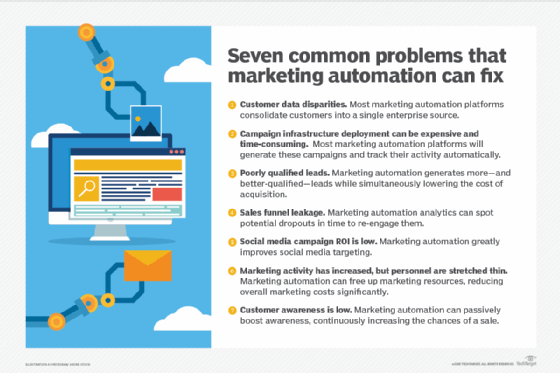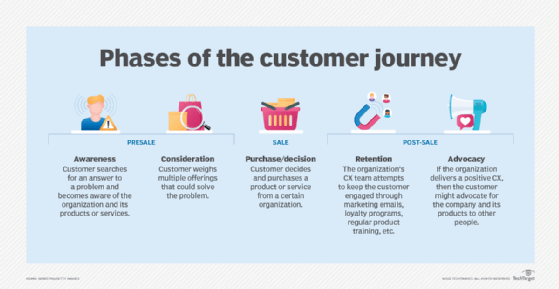Marketo
What is Marketo?
Marketo is a comprehensive marketing software-as-a-service platform designed to automate and streamline marketing tasks across multiple digital channels. In 2018, Adobe Inc., based in San Jose, Calif., acquired Marketo Inc., based in San Mateo, Calif. The addition of Marketo to the Adobe Experience Cloud gives business-to-business (B2B) and business-to-consumer (B2C) marketers enhanced capabilities to optimize their digital marketing campaigns and sales lead generation efforts.
Marketo's base features
Marketo works across multiple digital channels, including mobile devices, email, video, website and search advertisements. The platform promises increased understanding of customers, conversions and sales with personalized, automated campaigns aimed at targeted leads and potential customers. The platform's features include the following:
- Lead tracking.
- Lead nurturing.
- Campaign analysis.
- Search engine optimization (SEO).
- Website personalization.
- Digital advertisements.
- Customer relationship management (CRM) integration.
- Social marketing.
The platform records customer behaviors, including the customer's use of the site, what was viewed, the length of time spent on the site, and the date and time the customer visited. Additional customer data is recorded, such as company, job title, name, home address, email address and phone number. Information is stored in Marketo's database for quick access and analysis.

Most often used by medium-sized businesses, Marketo offers bundles for focusing on lead management, email marketing, consumer marketing, customer base marketing and mobile marketing. Customized products are available for several industries, including technology, healthcare, media, higher education and manufacturing.
Adobe's inclusion of advanced features and AI capabilities
The Adobe acquisition marked a significant milestone in the Marketo platform's evolution. The acquisition expanded Marketo's offerings, and its integration in the Adobe ecosystem positioned it as a key player in the digital marketing space.
Marketo benefits from Adobe's robust suite of creative and analytics tools, strengthening its ability to deliver personalized, effective marketing campaigns. This has led to enhanced capabilities including predictive analytics, artificial intelligence (AI) and machine learning capabilities.
Features such as predictive lead scoring and content personalization let businesses fine-tune their marketing strategies based on data-driven insights. These advancements help marketers anticipate customer needs and tailor their messaging and campaigns for maximum impact and conversion.
Integration with Adobe Experience Cloud
As part of the Adobe Experience Cloud, Marketo seamlessly integrates with a range of Adobe products, providing users with a comprehensive suite of tools for marketing, analytics, content management and more. This integration ensures businesses can leverage a unified platform for all their digital marketing needs, from campaign creation and execution to performance monitoring and analysis.
Marketo plays a pivotal role in customer experience management, enabling businesses to track and engage with customers at every stage of their journey. The platform provides detailed insights into customer behaviors and preferences, facilitating targeted marketing efforts that enhance customer engagement and loyalty.

Marketo vs. competitors
Marketo distinguishes itself in the marketing automation landscape through its integration with Adobe's suite, advanced analytics and customer experience focus. Based on research, here are some examples of how Marketo compares with some of its main competitors:
Eloqua
- Target market and complexity. Eloqua, part of Oracle Marketing Cloud, caters to large enterprises with complex marketing needs. A highly customizable platform that can handle intricate marketing processes, it contrasts with Marketo's more user-friendly interface that is suitable for both medium-sized and large enterprises.
- Integration capabilities. While both platforms offer extensive integration options, Eloqua benefits from its native integration with Oracle's suite of enterprise applications, potentially offering a deeper integration for companies already using Oracle products. Marketo, though, boasts robust integration with the Adobe suite, enhancing creative and analytical workflows.
HubSpot
- All-in-one platform. HubSpot serves as an all-in-one inbound marketing platform, providing tools for content management, social media marketing and SEO in addition to marketing automation. Marketo focuses more intensely on the marketing automation aspect and relies on integration with other platforms, like Adobe Experience Cloud, for additional functionalities.
- Ease of use. HubSpot is often praised for its ease of use and is designed to cater to businesses of all sizes. Marketo, while user-friendly, often requires more technical knowledge and is better suited for medium to large organizations that need more complex marketing automation capabilities.
Pardot
- Salesforce integration. As part of the Salesforce ecosystem, Pardot offers seamless integration with Salesforce CRM, making it an ideal choice for businesses already using Salesforce. This deep integration allows for advanced lead scoring and nurturing capabilities in the Salesforce environment. Marketo also integrates with Salesforce, but is designed to function well within the broader Adobe ecosystem.
- B2B focus. Both Pardot and Marketo are strong in B2B marketing, but Pardot has a more pronounced focus on B2B with features like advanced email marketing and lead management specifically designed for B2B sales cycles. Marketo provides robust features for both B2B and B2C contexts.
These comparisons highlight the key differences in target market, integration capabilities, ease of use and specific functionalities, helping businesses make an informed decision when choosing a marketing automation platform that best fits their needs.
Marketo, enriched by Adobe's acquisition, offers a dynamic, powerful platform for modern digital marketing needs. With its advanced AI features, seamless integration with Adobe Experience Cloud and strong emphasis on customer experience management, Marketo continues to be a leader in the marketing automation space, providing businesses with the tools they need to execute effective, personalized and impactful marketing campaigns.
With the right marketing automation software, marketers can streamline their workflows and focus more on creative tasks. Compare the top marketing automation software.
